Collection State Dinners
A State Dinner honoring a visiting head of government or reigning monarch is one of the grandest and most glamorous...
Main Content

In this detail of a 2007 oil painting by Peter Waddell, Ike Hoover attends to an electric light fixture in the cross hall of the White House.
The White House Historical AssociationA group of physicians and surgeons meeting in Washington 1891 was treated to a reception at the White House on the evening of September 24. President Benjamin Harrison moved among the gathering, and "extended a hearty grasp to each of the doctors."1 The event included "lively airs" by the Marine band, and a chance to wander through the conservatory and reception rooms.
The guests also had the exciting opportunity to experience the latest technology in the White House. In a front page article on September 25, 1891, the Washington Post reported that as a special treat for the doctors, "The East Room . . . was darkened, and the electric lights were turned on. The brilliant effect was greatly admired."2
Back in May, the Post had remarked on the progress of electrifying the Executive Mansion. "The men are still at work putting in the electric lights, and when they are through," the Post declared, "there will be nearly 1,000 incandescent lamps in the White House."3
One of the young men on the installation job had reported for duty on May 6. He was nineteen-year-old Irwin H. Hoover, known as "Ike." In his memoir, Hoover recalls,
"In due time I got down to the job of wiring and installing the electric appliances. The wonderful old chandeliers, built for gas, were converted into combination fixtures and the candle wall brackets were replaced by electric fixtures in the fashion of the time. . . . The Harrisons were all much interested in this new and unusual device that was being installed; so much so, that we got quite well acquainted with them."4
Hoover had been told he would not be needed after May 15, but the next day he received an offer of full-time employment as White House Electrician. He hesitated to take the job because the salary was so low, but accepted the offer and became, "like the electric lights, a permanent fixture."5
Ike Hoover spent 42 years working at the White House, advancing from electrician into the ushers' ranks. During the Taft administration he was appointed Chief Usher, and he held this job until he died in 1933.
A State Dinner honoring a visiting head of government or reigning monarch is one of the grandest and most glamorous...
On July 11, 1798, Congress passed legislation that created the United States Marine Corps and the Marine Band, America's oldest professional musical...
For more than one hundred years, White House Social Secretaries have demonstrated a profound knowledge of protocol and society in...
The computer, the car, space travel. These technologies, while seemingly old hat now, are examples of monumental technological advancement. Even...
Wine has a long and important history in the White House, playing a unique role in entertaining, public ceremonies, and...
In 1816, Commodore Stephen Decatur, Jr. and his wife Susan moved to the nascent capital city of Washington, D.C. With...
It is hard to imagine that it was something as casual as a lunch conversation between a newly elected president...
A dinner at the White House has always had significance beyond the gastronomical delights. The elegance of the State Dining...
Whether by hoof, air, waterway, road, or rail, the President’s access to reliable transportation is essential during their time in...
Since the first cherry blossom planting in 1912 by First Lady Helen Herron Taft, Washingtonians have celebrated the scenic beauty and...
The White House has hosted many important heads of state over the years. Typically, the president and first lady join...
From diplomatic dinners to holiday gatherings, the White House has always played a central role in the nation’s official en...